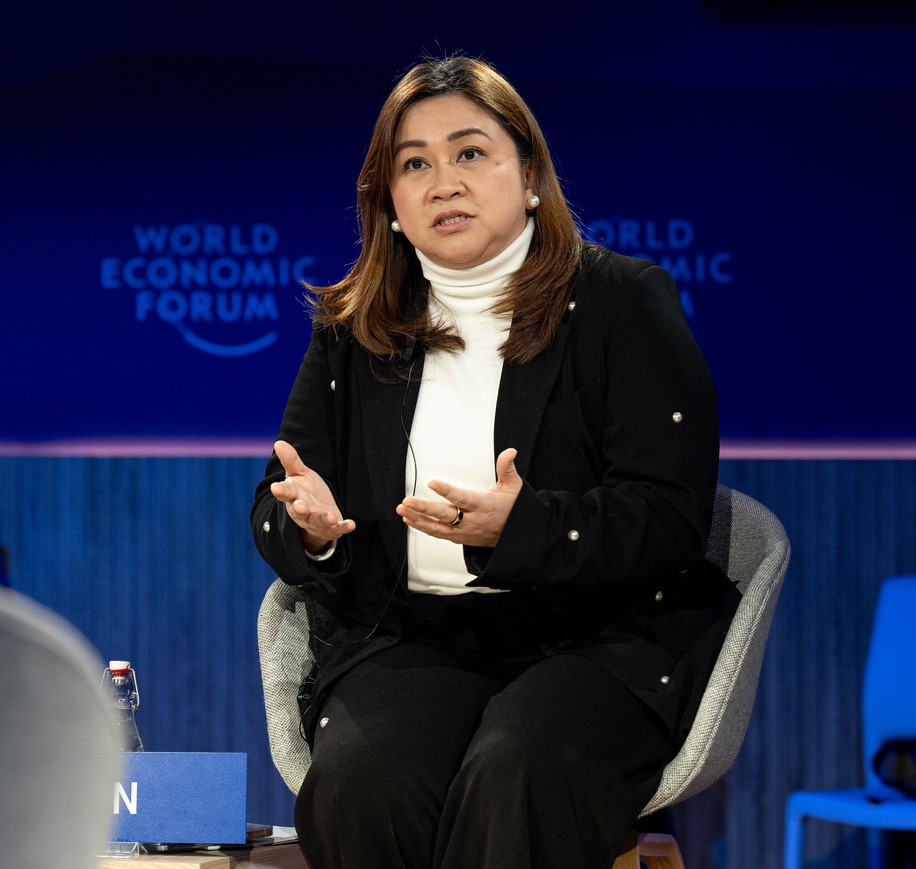
Inclusivity must remain a priority within Asian economies amid the increasingly widespread adoption of emergent technologies like artificial intelligence (AI), according to a panel discussion among global policymakers and top business figures at the 2025 annual meeting of the World Economic Forum in Davos.
Martha Sazon, president and CEO of Mynt, the parent company of GCash, represented the Philippines’ fintech industry and its contributions to the country’s economic resilience at the World Economic Forum (WEF) Annual Meeting 2025 in Davos-Klosters, Switzerland.
Sazon participated in the WEF panel session titled “Leaving Asia’s Comfort Zone” which aimed to explore the potential of emerging technologies such as artificial intelligence in driving inclusive economic growth. She shared the panel with government leaders, policy experts, and top industry figures Gan Kim Yong, Singapore deputy prime minister; Pichai Naripthaphan, Thailand minister of commerce; Milton Cheng, global chair of USA’s Baker McKenzie; and Angela Wang Nan; chairman of the American and European sectors of China-based Neusoft, with Haslinda Amin, Bloomberg’s chief international correspondent for Southeast Asia, moderating.
Sazon shared with her co-panelists and the WEF the success of GCash in working toward inclusivity by harnessing technologies for social good, and through close collaboration among related industries and with the Philippine government.
“GCash has worked toward using tech, data, and customer-centricity to address societal issues,” stressed Sazon, highlighting the goal of GCash in ensuring the benefits of harnessed technologies can be felt by all. “At the heart of what we do, really, is financial inclusion.”
In keeping with its vision of Finance For All, GCash has adopted AI to accelerate financial progress for every Filipino. The country’s leading finance super app has utilized AI, through GScore, to determine a user’s creditworthiness based on their in-app activity. This has been groundbreaking in allowing underserved users to overcome traditional documentary requirements and even collateral to access much-needed funds.
GCash has also used artificial intelligence to personalize user experiences through a robust customer relationship management system.
Sazon shared with the panel, “A big part that AI can provide is personalization [as it would] help us tailor-fit solutions to address the issues we see in each segment. In the same way, AI can help us further earn the trust of our customers and keep our platform secure. We’ve been working with other global institutions to advance AI—not just for our customers but even internally.”
AI has been powering the app’s strengthened security measures as well, by employing face recognition technology that checks for liveliness to ensure accounts can only be accessed by their owners. Within the organization, AI has likewise helped boost productivity by employing generative AI customer experience and employee co-pilots.
The panel session also put a focus on generative AI and its potential to bring the Asia-Pacific region from the industrial era into the “Intelligent Age.” By 2030, AI is estimated to contribute USD 15.7 trillion to the global economy. Meanwhile, the Philippines stands to gain USD 47 billion (roughly PHP 2.6 trillion) annually, prompting businesses to hasten their use of AI-powered solutions.
Key to adopting AI, according to Sazon, is the collaboration with existing human resources.
She said, “The way we see it is [our employees and AI can work together] to make our services more intelligent.” The panel elaborated on this by stressing the importance of public-private collaboration in investing in upskilling and future-proofing Asia’s workforce, not only with technical training but through establishing ethical standards, broadening critical thinking to include AI concepts, and increasing adaptability skills.
Closing gaps by unlocking financial access
Sazon also emphasized that true innovation fosters inclusivity – from farmers to grassroots traders, and the millions of micro, small, and medium enterprises (MSMEs). “Before the pandemic, the Philippines was highly unbanked, where only 29% of the population were banked,” said Sazon, pointing out the inequity in financial literacy and access to services in the country. “Because of the adoption of fintech in the Philippines, the banked rate has now gone up to 65%. And the rate of those with financial access is even higher.”
This began with the introduction of the first-ever eKYC (electronic Know Your Customer) process in the Philippines, followed by simplified cashless payments. Today, GCash has over 94 million users, with access to loans, investments, and insurance at the tap of a phone screen.
Exemplifying responsible AI
Sazon shared with her co-panelists her optimism about the use of AI and the future of fintech, and its growing potential to secure financial inclusion. Her final remarks on helping Asia transition from a follower to a leader in the Intelligent Age raised the importance of the human element: “What I am very hopeful and excited about is the culture in Asia—the buzz, the energy, and the agility of the people [there],” she said. “We’re excited to adopt, and we adapt quickly. We try, and if we fall, we get up and try again. That cultural mindset and collaboration will help us leapfrog in the Intelligent Age.”
The World Economic Forum brings together leaders, policymakers, influential business figures, and industry experts from over 130 countries to foster a multi-stakeholder approach to common objectives. This year’s theme, “Collaboration for the Intelligent Age,” focused on critical conversations on harnessing innovation and public-private cooperation to better address societal and economic challenges.
